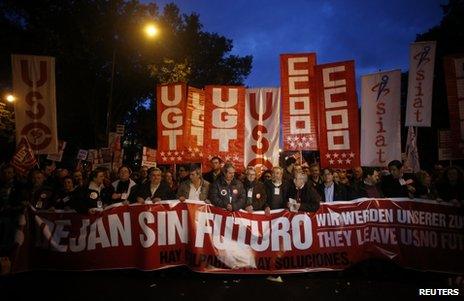Eurozone back in recession
- Published
- comments

Millions of Europeans took industrial action on Wednesday
The eurozone is back in its second recession since 2009. Double dip is here.
Both France and Germany but their economies are slowing. The eurozone's strongest economies cannot escape the ill winds blowing elsewhere.
Spain is now in the second year of recession. Its economy has been shrinking for 15 months. The economy which saw the biggest fall in the last quarter was the Netherlands - it shrank by 1.1%. Both northern and southern Europe are hurting.
The charge levelled at Germany and the European Commission is that they under-estimated the effects of austerity on output. There are signs that the Commission is backtracking. Spain is the latest country to be allowed to miss targets for reducing its deficit and to be granted a reprieve. Portugal and Greece have also been granted more time.
The eurozone is in a bind. Its policy is to reduce deficits and to adopt structural reforms, such as greater flexibility in the labour market. The heart of the problem, however, is the lack of competitiveness of many southern countries in relation to Germany. The gap cannot be narrowed by devaluation in a monetary union. The only option is to slash wages and pensions and to reduce unit labour costs. That, of course, weakens demand and pushes countries further into recession.
That is what is driving the massive protests - the sense that countries face years of hardship. The single currency is not seen as delivering higher living standards, but pain. And next year the European Commission sees growth of 0.1% at best.
There are some green shoots: Spain and Portugal's exports are doing well, but it is doubtful that exports alone will return these countries to growth. What they may indicate is that over time some of the reforms will bring benefits, but Europe does not have time.
It was noticeable last night in Madrid that when Chancellor Angela Merkel's name was mentioned the boos echoed around the crowd. One of the leaders of the union which organised the protests said today "nothing is getting better. The situation is getting worse". The size of the crowds on the streets last night - maybe 300,000, maybe more - should serve as a warning that Europe's people will not be patient for ever.
The President of the European Central Bank, Mario Draghi, has spoken of "a slow, gradual, but also solid recovery". It does not feel that way and Europe's officials have a poor record in judging this crisis.
Today's figures and the street protests are likely to strengthen the hands of those who say the current policy is damaging Europe's economy.